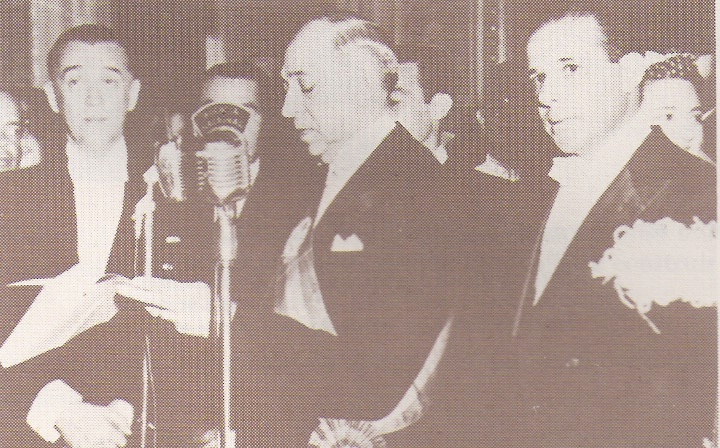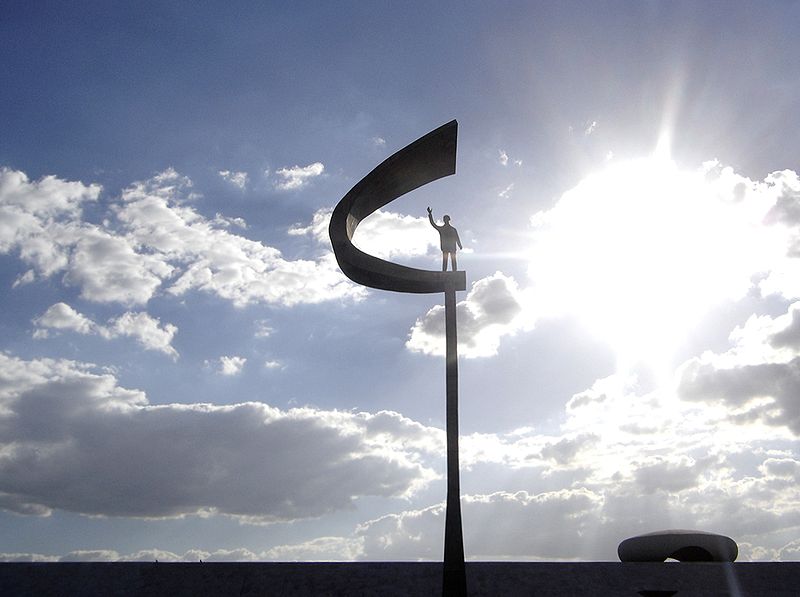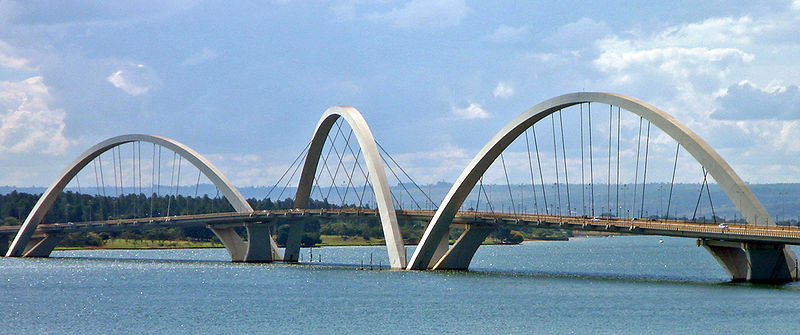<Back to Index>
- Geologist James Hall, 1811
- Painter Lodovico Cardi da Cigoli, 1559
- 21st President of Brazil Juscelino Kubitschek de Oliveira, 1902
PAGE SPONSOR
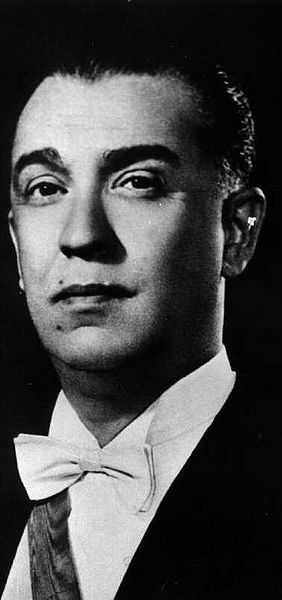
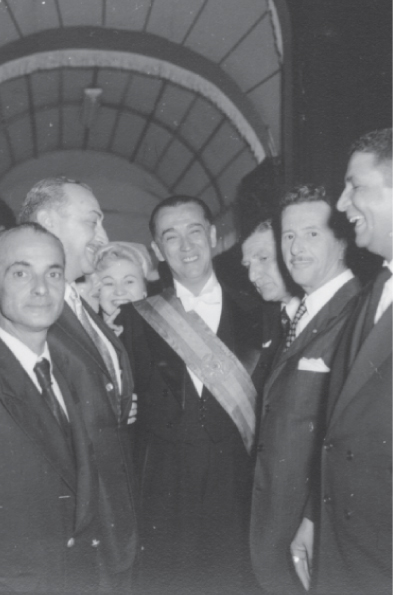
Juscelino Kubitschek de Oliveira (JK) (September 12, 1902 – August 22, 1976) was a prominent Brazilian politician of Czech origin who was President of Brazil from 1956 to 1961. He was born in Diamantina, Minas Gerais, and died in 1976. His term was marked by relative economic prosperity and political stability, being most known by the construction of a new capital, Brasília.
Kubitschek was born into a very poor family in the countryside of Brazilian state Minas Gerais. His father, João César de Oliveira (1872 – 1905), who died when Juscelino was two years old, was a traveling salesman. He was raised by his mother, a schoolteacher named Júlia Kubitschek (née Kubíček; 1873 – 1971), of Czech descent.
Trained as a medical doctor, Kubitschek was elected to the Chamber of Deputies of Brazil from his home state in 1934. With the imposition of Getúlio Vargas' dictatorship in 1937, Kubitschek returned to practicing medicine. However, he was soon appointed mayor of Belo Horizonte in 1940. There, he idealized the project of an artificial lake (Pampulha Lake) to supply water to the city and also an architectural complex, with several buildings projected by renowned architect Oscar Niemeyer.
He was again elected to the National Congress of Brazil in 1945 and became governor of the state in 1950. In 1955, he ran for president with the slogan "fifty years of progress in five" and won.
He was sworn in on January 31, 1956 as President of what was then known as the Republic of the United States of Brazil. Kubitschek's
presidency was marked by a time of political optimism. He launched the
"Plan of National Development", also known as the "Plano de metas
(Goal's plan)", famous by the motto: "Fifty years of progress in five." The
plan had 31 goals distributed in six large groups: energy, transports,
food, base industries, education and the main goal, the construction of Brasilia. This plan searched to stimulate the diversification and expansion of the Brazilian economy, based on the industrial expansion and the integration of the national territory. His
government was marked by a time of political stability and maintenance
of the democratic regime. Kubitschek used his outstanding political
ability to reconciliate Brazilian society. He avoided any direct clash with his political adversaries, like the UDN,
the main opposition party of the Kubitschek administration. He also
gave political amnesty to the men that took part in the Jacareanga and Aragarças military revolts. Although
his main project was to develop the national industry, it was with the
"Goals plan", launched in 1956, that there was a greater opening of the
national economy for foreign capital. He exempted from taxes all the
machines and industrial equipments imports, as well as the foreign
capital. However, the exemption was made only if the foreign capital
was associated with the national capital ("associated capital"). To
amplify the internal market, he developed a generous credit policy. He
promoted the implementation of the automobile industry, with the coming
of the automobile industries to Brazil, promoted the naval industry and
the heavy industry, and the construction of hydro-electric power
stations. With the exception of the hydro-electrical companies,
Juscelino practically created no state owned companies. He also had a
very progressive agenda on the Education front, but that was never
carried out. Kubitschek
also cared a lot for the construction of the great transregional roads.
He was criticized for focusing only in road construction and putting
aside the rail transportation. Today, this decision is still
controversial. Still, the construction of the roads helped the
integration of the Amazonic region, together with the construction of
Brasilia. The
economy boomed, but at considerable cost. His opponents alleged that he
had brought "fifty years of inflation in five." Like many other Latin
American currencies, the cruzeiro was repeatedly devalued. The country
also went further into debt trying to pay for various ambitious projects, although such debts were very small compared to the
tremendous rise of the external debt during the military dictatorship (1964 – 1985). It
has been said that Kubistchek had little time for accountants. Most of
his grandiose plans as Mayor of Minas Gerais's elegant capital city,
Belo Horizonte, and his later feats as State Governor were made
possible only by virtue of his economic and administrative 'guru', an
ethical, wise and hard working politician called Milton Campos. Admittedly,
from 1964 to 1980, Brazil grew steadily, and did so in compliance with
a definite strategy and some of the country's best economists and
planners were in office during this period. It was in the late 60s and
early 70s that Brazil's current energy potential was fully developed.
During most of this 20-year period, the generals that ruled Brazil were
elected by indirect vote and in several instances congressional activities were severely restricted and often banned altogether. The
cost of dictatorships is all too evident: serious deterioration of
institutional government and terrible breaches of human rights. It was
during the military years that Brazil first became known for torture in
prisons and human rights abuse. Juscelino
Kubitschek's administration, however, which came before the generals's,
is seen as relatively peaceful and democratic. It is true that his
inauguration was made possible only by a military coup, staged by
General Henrique Lott in 1956, who deposed the legal stand-in President
Carlos Luz, lest the latter would not hand in power to president-elect
Kubitschek on the grounds of the scarcety of votes (Kubitschek, the
winner on the 1956 presidential elections, received an unimpressive 36
per cent of the poll, and some legal haggling made a legal requirement
that would put a mandatory constitutional prerequisite of 51 per cent).
Still, Juscelino took office as planned and served a full term. By the end of his term, the foreign debt had grown 1.5 billion dollars larger, getting to 3.8 billion dollars in the whole. The inflation and
wealth inequality had grown larger, with the occurrence of strikes in
the rural zone that expanded to the urban areas. However, the minimum
wage from that time is still considered the largest in any moment of
the Brazilian history. Kubitschek ended his time in office with a growth of 80% in industrial production but with an inflation rate of 43%. The
idea of building a new capital in the center of the country was already
idealized in the Brazilian constitution of 1891, 1934 and 1946, but it
was only in 1956 that the construction began to take form. The works, led by the architects Lucio Costa and Oscar Niemeyer, started in the month of February 1957. More than 200 machines were put
to work and 30.000 workers came from every part of the country,
especially the northeast.
The construction went on day and night, with the objective of finishing
Brasília by 21 of April 1960, in a homage to the Inconfidência Mineira.
The building was finished in 41 months, before the established date. As
soon as it was inaugurated, Brasília was considered a
masterpiece of modern urbanism and architecture. The
New capital was to integrate all the Brazilian regions, create jobs and
absorbe workforce from the Brazilian Northeast and to stimulate the
economy of the Central west and North. Kubitschek
was not free from controversies. He was often accused of corruption.
The accusation began at the time he was governor and intensified during
his presidency. The building of Brasília was the main source of
accusations. There were serious reasons to believe that people from
Juscelino's political group had been favoured in the construction.
Also, the Brazilian Pan-Air had the monopoly of people and goods
transportation during the construction, another source of controversy. During
his office, the Brazilian press even said that he had the seventh
greatest fortune in the world, a claim that was never proved. The
candidate for the next presidency, Janio Quadros,
used the accusations during his presidential campaign, promising to
"sweep the corruption out of the country". Later, during the military
regime, Juscelino would be questioned about the corruption allegations
and about supposed ties with communist groups Kubitschek was succeeded by Jânio Quadros in 1961. After the military took power in
1964, Kubitschek's political rights were suspended for 10 years. He
went into self-imposed exile and stayed in numerous U.S. and European
cities. Despite
all the problems, Kubitschek's presidency was seen as a time of
optimism. The president was a cheerful and charismatic figure that
exhaled confidence. During
the 50s, the Brazilian society was in transition from a rural to an
urban society. With the industrial reforms, the emergence of the
country as an industrial force could not be stopped anymore. This was
also the time when household appliances started to enter people's
lives. The middle class was now able to buy products that helped in
their everyday tasks thanks to the infusion of foreign capital. The
"American way of life" started to be implanted in the public's
consciousness with radio shows, magazines and the newly arrived television. Brazilian cinema was
at its peak, with many movies being produced every year, mostly
comedies called "Chanchadas". The prestige of the Brazilian cinema was
such that in 1953 the movie "O Cangaceiro" received several foreign
awards. Movie Companies like "Vera Cruz" and "Atlântida" were at
their pinnacle. Radio station audiences, especially for "Rádio Nacional", peaked. In 1958, João Gilberto published his record "Chega de Saudade", creating the Bossa Nova. Artists like Tom Jobin and Vinicius de Moraes came to be nationally and internationally known. In sports, the national soccer team became 1958 FIFA World Cup champions in Sweden. Boxer Éder Jofre was world champion, as was the Brazilian basketball team in 1959, in Chile. Tennis player Maria Esther Bueno won both Wimbledon and US Open tournaments. All these achievements infused a sense of victory and confidence in the future in the Brazilian public. He returned to Brazil in 1967, but was killed in a car crash in 1976, near the city of Resende in the state of Rio de Janeiro. 350,000 mourners were present at his burial in Brasília. He is now buried in the Memorial JK, which was opened in 1981. On April 26, 2000, former governor of Rio de Janeiro, Leonel Brizola, alleged that the ex-presidents of Brazil, João Goulart and Kubitschek, were assassinated as part of Operation Condor and
requested the opening of investigations into their deaths. They were
purported to have died respectively of a heart attack and a car
accident. The Presidente Juscelino Kubitschek International Airport of Brasília and the Juscelino Kubitschek bridge were named after him. There is also a luxurious hotel named Kubitschek Plaza located in that city.
Many
cities have things named after him, "JK" is a ubiquitous acroynm
honoring the ex president, who is often seen by Brazilians as the
"father of modern Brazil".
In 1980, his daughter Márcia (1942 – 2000) married Cuban-American ballet star Fernando Bujones. Márcia Kubitschek was elected to the National Congress of Brazil in 1987 and served as lieutenant governor of the Brazilian Federal District from 1991 to 1994.
